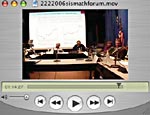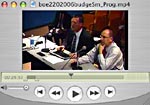These are thoughts authored by community member and MMSD parent, Beth Swedeen:
The issue of children being adequately served by special education services is a challenge playing out across the country. Certainly, as someone who works with families of children with disabilities and as a parent of a child with disabilities myself, I know the anguish and frustration of watching a child flounder when needs are not adequately met. I also know families who use public school choice and even move so their child receives adequate services. This is not a Madison-specific problem.
Single solutions, such as eliminating cross-categorical staffing or segregating children into ability-grouped learning situations, is simplistic and can lead to unintended consequences, such as lower expectations in those segregated settings, or rigid one-size fits all instruction by “learning disability” or “cognitive disability” teachers.
In its most heart-breaking forms, category-specific programming in smaller districts leads to children being pulled out of their home school and bussed 15 miles or more away to the “cognitive disability” or “emotional disability” program in a neighboring town. I am working with 2 families who are facing that right now. The fact that their child, who has made friends and connections at school, is being ripped away from the community because he or she has Down symdrome or cerebral palsy is truly tragic. Less than 15 years ago, Madison grouped students in this way, and children did not attend their neighborhood school, not based on parent choice, but based on their disability labels.
Madison Partners for Inclusive Education is working closely with MMSD and with the community as a whole to help support students, their families, and educational staff in improving outcomes for students with special needs.
MMSD has some real positives going for it:
- More than 97 percent of special needs students are either being served in their home school or in a school of the parent’s choice.
- The vast majority of students with disabilities at all ages are spending the majority of their day in regular education classrooms (I believe the highest rate of any urban school district in the country.)
- Leadership at the administrative and at most building levels is committed to inclusive practices.
- Ties to the University of Wisconsin and evidence-based best practices are strong.
- Commitment to adequate training and continuing education is present.
Madison Partners has also identified several key areas in which they want to continue to partner with the district to further strengthen the quality of services:
- Input into hiring at key leadership levels (building principals).
- Continued partnerships with resources in the community and with families to elevate services and get much-needed supports to classroom teachers, special educators, and related staff.
- Continued emphasis on total team teaching (using all resources present, including reg/special ed, speech, OT/PT therapists, classroom aides, and related staff to meet every need in classrooms. This also means sharing resources: for instance, reading specialists in schools working with special educators on specific strategies to meet student reading goals.)
- Continued resources for in-service and pre-service training on effective differentiation.
- Direct training for families and students on how students can take part in and play leadership roles in developing their own Individual Education Plans (IEPs).
- More leadership opportunities in schools for students with disabilities.
- Working with MMSD and community to strengthen state funding for schools.
We know that no single person, no matter how gifted, can meet diverse needs of 15-20 students in any given classroom. Instead of separating children out, though, we endorse strategies than engage the entire school team in the success of each student. Together, we believe we can elevate outcomes, not just for students with disabilities, but for all students in our district.

 Video and audio from Wednesday’s Math Forum are now available [
Video and audio from Wednesday’s Math Forum are now available [


